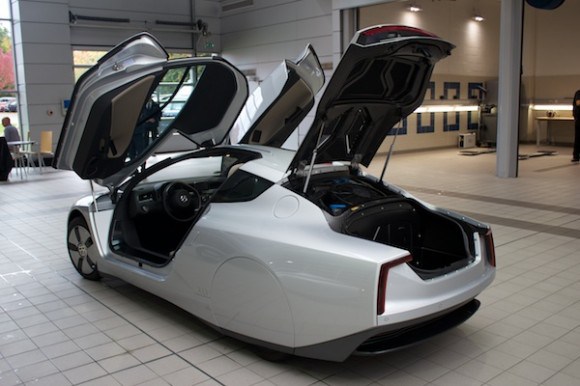Volkswagen Thinks of Using Solid-State Battery Packs for Super-Long Range Electric Cars
- 28/08/2015
- Transport
- Posted by Tessa Romarez
- Leave your thoughts
The success of Volkswagen in making electric cars is phenomenal.
It just began producing EVs in late 2013, and yet, it now sells four various electric and plug-in hybrid models in different markets around the world. Audi, its sister company also offers three models.
In the next five years, the numbers of Volkswagen and Audi models are projected to increase dramatically by 2020. These car makers have a goal of adding more plug-in variants in the coming years.
To reach that goal, the Volkswagen group has invested considerable amount of time and money for the research of various types of battery technologies. It is also cooperating with industry leaders to significantly enhance both lifespan and energy density of its current battery technologies.
Today’s battery technologies of Volkswagen have made possible the introduction of the Audi R8 e-tron plug-in sportscar to the market. However, the car maker is quick to state that these Volkswagen plug-in cars are just a stop-gap measure as it tries to reach its goal of making 375+ mile electric cars.
According to a Bloomberg report, Volkswagen is thinking of deciding if solid-state battery technology developed by U.S. company QuantumScape Corp. is ready for use in future models.
QuantumScape, was established by several Stanford University alumni in 2010. This company has been developing solid-state battery technology which, in the future, could replace traditional lithium-ion battery technology used in most electric cars today.
Solid-state batteries have both solid electrodes and solid electrolytes not like the typical lithium-ion batteries which have solid electrodes but a liquid or gel electrolyte. They have several advantages over traditional Li-ion batteries.
They don’t spill, are burn resistant, have a high energy density, and are less affected by temperature changes than current generation liquid electrolyte batteries. These batteries also tend to have higher ionic conductivity than non-solid-state batteries. This enables them to have low internal resistance, allowing for high power densities.
Last December, Volkswagen was able to acquire a 5 percent holding in QuantumScape. It has been working with the company since in expanding and developing its solid state technology.
Martin Winterkorn, Volkswagen CEO visited QuantumScape’s headquarters in November last year. He expects VW to make a decision on how to proceed with QuantumScape’s technology in the next four months.
“I was there last year,” Winterkorn said. “Progress has been made,” he added.
QuantumScape’s battery technology, even in its current form, can already produce a battery pack no larger or heavier than those found in current Volkswagen vehicles. And yet the battery could yield a range greater than 430 miles per charge. This is due to its superior energy density.
If this battery will really work, it will give Volkswagen the capability of leap-frogging the competition in the mainstream plug-in vehicle market. In addition, the company will be able to challenge Tesla Motors which has the longest-range electric car battery in the plug-in vehicle market today.
This technology would also provide the car maker with a means of producing Volkswagen plug-in cars with gasoline-like ranges, without depending on expensive, complicated hydrogen fuel cell technology.

